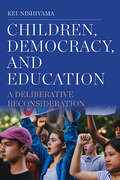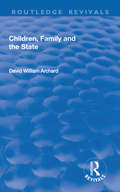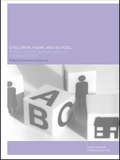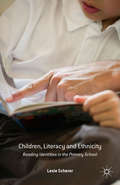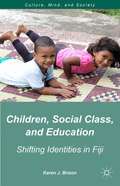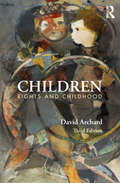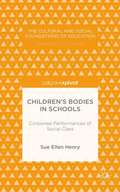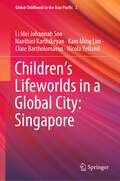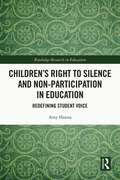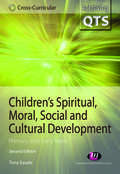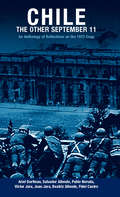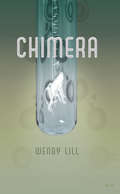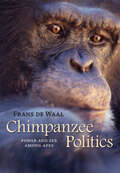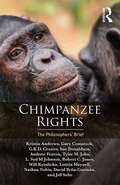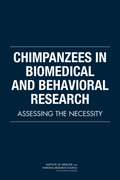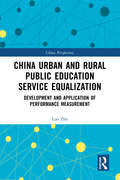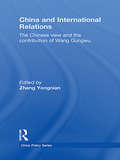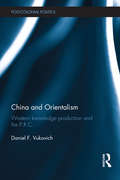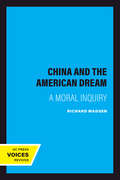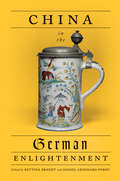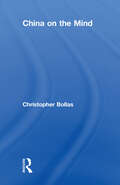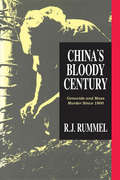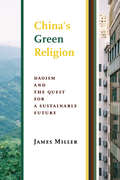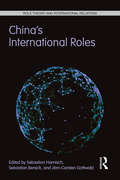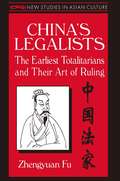- Table View
- List View
Children, Democracy, and Education: A Deliberative Reconsideration
by Kei NishiyamaLooks at the present norms and practices of a new form of democratic education and children's democratic participation, utilizing both theoretical and empirical examination of children's deliberative agency.How children participate in democracy has shifted toward more communicative, networked, and creative models than before. In political science and political theory, however, surprisingly little is understood about what if anything children can contribute to democracy and how they would do so. Traditionally, children have been considered as mere future citizens who are acknowledged only when they behave in accordance with adults' expectations. In this sense, children are one of the last frontiers of democratic inclusion, as they have long been seen and not heard. Children, Democracy, and Education critically examines and proposes how to counteract such a traditional view on children and retheorizes their position and role within contemporary democracy. Utilizing the empirically grounded concept of deliberative democratic learning, Kei Nishiyama then argues how we enable children's communicative participation and development in classrooms, schools, and social movements to expand the inclusive quality of democracy.
Children, Family and the State (Live Questions In Ethics And Moral Philosophy Ser.)
by David William ArchardThis title was first published in 2003. This book critically examines the moral and political status of the child by a consideration of three interrelated questions: What rights if any does the child have? What rights over and duties in respect of a child do parents have? What rights over and duties in respect of a child does the state have? David Archard adopts three areas for particular discussion on the practical implications of the general theoretical issues: education, child protection policy, and the medical treatment of children. Providing a clear legal context and a sharper, contemporary discussion of the question of rights, this book presents a clear introduction to the key issues in the moral and political status of children.
Children, Home and School: Regulation, Autonomy or Connection?
by Ros EdwardsIn contemporary western societies, there are increasing emphases on children being the responsibility of their parents, contained within the home, and on their compartmentalisation into separate and protected organised educational settings. Thus 'home' and 'school' form a crucial part of children's lives and experiences.This book explores the key institutional settings of home and school, and other educationally linked organised spaces, in children's lives, and the relationships between these. It presents in-depth discussions concerning new research findings from a range of national contexts and focuses on various aspects of children's, and sometimes adult's, own understandings and activities in home and school, and after school settings, and the relationship between these. The contributors assess children from a variety of backgrounds and circumstances and consider how these children see and position themselves as autonomous within, connected to or regulated by home and school. Discussion of the impact of policy and practice developments on the everyday lives of these children is also included.
Children, Literacy and Ethnicity: Reading Identities in the Primary School
by Lexie SchererThis book explores children's meaning making of the books they learn to read with, especially relating to the intersections of race, gender and class. Based on research using a participative, innovative design with young children, issues of identity, belonging and classroom hierarchies are explored in complex and poignant ways by the children.
Children, Social Class, and Education
by Karen J. BrisonClass-based self-perception is a rising issue worldwide. Through observation in kindergartens in Fiji, Brison examines how schools instil these ideas in Suva children. Teachers have different goals depending on the social background of the families while students create friendships through shared experience of toys, gender roles, and mass media.
Children: Rights and Childhood
by David ArchardChildren: Rights and Childhood is widely regarded as the first book to offer a detailed philosophical examination of children’s rights. David Archard provides a clear and accessible introduction to a topic that has assumed increasing relevance since the book’s first publication. Divided clearly into three parts, it covers key topics such as: John Locke’s writings on children Philippe Ariès’s Centuries of Childhood children’s moral and legal rights a child’s right to vote and to sexual choice parental rights to privacy and autonomy defining and understanding child abuse. The third edition has been fully revised and updated throughout with a new chapter providing an in-depth analysis of the United Nations Convention on the Rights of the Child (UNCRC) and Part 2 has been restructured to move the reader from general theoretical considerations of children’s rights through to practical issues. This volume is ideal reading for advanced studies across Philosophy, Social Work, Law, Childhood Studies, Politics, and Social Policy.
Children’s Bodies in Schools: Corporeal Performances of Social Class
by Sue Ellen HenryBringing together sociology of the body with powerful examinations of educational theory and social class, Henry examines how children's experiences of school and pedagogy are shaped by their bodies and the ideas of social class and class identity that their bodies carry.
Children’s Lifeworlds in a Global City: Singapore (Global Childhoods in the Asia-Pacific #2)
by Nicola Yelland Clare Bartholomaeus Li Mei Soo Nanthini Karthikeyan Kam Ming LimThis book examines connections between policy contexts, school experiences and everyday activities of children growing up in the global city of Singapore. In particular, it explores how Singapore children’s everyday experiences inside and outside of school shape their orientations towards educational success. Alongside an analysis of school life and educational policies, it also considers children’s out-of-school activities, including leisure, homework, and enrichment activities, and connections between these and their school-based activities. The book draws on empirical data from Primary 4 classes in two Singapore schools in the form of student-completed surveys, classroom ethnographies, student responses to a learning dialogues activity, and a re-enactment of one child's out-of-school life, as well as curriculum and policy analysis. It provides readers with an in-depth understanding of Singapore Primary 4 children’s experiences inside and outside of school, including the structure of timetables and pedagogical approaches encountered in school lessons, children’s enjoyment of activities inside and outside of school, children’s engagement and wellbeing at school, and the impact of Singapore’s educational policies on children’s learning experiences. Moving beyond a simplistic focus on Singapore children’s academic performance in international high-stakes testing, the book offers a comprehensive exploration of their lives inside and outside of school. This holistic approach is unique in the Singapore context and contributes to a greater understanding of children’s everyday lives in the city.
Children’s Right to Silence and Non-Participation in Education: Redefining Student Voice (Routledge Research in Education)
by Amy HannaThis insightful book re-examines the concept of student voice through an exploration of children’s implicit rights to silence and non-participation. By considering what remains unspoken but is voiced through silence, this book theorises silence through the lens of power. Responding to calls for more critical approaches to children's participation under the UN Convention on the Rights of the Child, this unique exposition of silence ventures beyond traditional notions of voice as a defining term for justice and participation, and traditional understandings of silence as powerlessness. Instead, this book presents young people’s uses and understandings of silence at school as an instrument of power. Based on empirical research, the book reconceptualises children’s participation rights through silence. Addressing an important gap in the literature on student voice and children’s participation, this book is a valuable resource for academics, researchers, and postgraduate students in the fields of children’s human rights, childhood studies, and educational philosophy.
Children′s Spiritual, Moral, Social and Cultural Development: Primary and Early Years (Achieving QTS Cross-Curricular Strand Series)
by Tony EaudeThe second edition of this popular text has been revised and updated to include the new Professional Standards needed to achieve Qualified Teacher Status (QTS). Tackling these elusive but fundamental aspects of children′s development, this text places the importance of spiritual, moral, social and cultural understanding in a cross-curricular context. It directly links between children′s attainment and the wider aspects of personal development, beliefs and values, explaining the environment in which learning flourishes and demonstrating how trainees can promote this in their teaching. In addition, it helps enrich the trainee teacher′s experience, laying firm foundations for their continuing professional development.
Chile: An Anthology of Reflections on the 1973 Coup
by Ariel Dorfman Fidel Castro Ricardo Fredes Pilar Aguilera Salvador AllendeThis anthology reclaims the tragic date of September 11 as the anniversary of the US-backed coup in Chile in 1973 by General Augusto Pinochet against the popularly elected Allende government.The selection combines moving personal accounts with a political/historical overview of the coup's significance, featuring Ariel Dorfman's poignant essay, "The last September 11" and President Allende's last radio broadcast.
Chimera
by Wendy LillThis compelling drama explores the ethical controversy and public policy surrounding reproductive technologies. Wendy Lill has lived almost all the roles the play dramatizes: NDP critic for both culture and persons with disabilities, she came to politics after a career in community health care and as a reporter for the Canadian Broadcasting Corporation. Cast of 2 women and 5 men.
Chimpanzee Politics: Power and Sex among Apes
by Frans de WaalThe first edition of Frans de Waal's Chimpanzee Politics was acclaimed not only by primatologists for its scientific achievement but also by politicians, business leaders, and social psychologists for its remarkable insights into the most basic human needs and behaviors. Still considered a classic, this updated edition is a detailed and thoroughly engrossing account of rivalries and coalitions—actions governed by intelligence rather than instinct. As we watch the chimpanzees of Arnhem behave in ways we recognize from Machiavelli (and from the nightly news), de Waal reminds us again that the roots of politics are older than humanity.
Chimpanzee Rights: The Philosophers’ Brief
by Kristin Andrews Will Kymlicka Sue Donaldson Jeff Sebo Robert C Jones Gary L Comstock Crozier G.K.D. Andrew Fenton Tyler M John L. Syd Johnson Letitia Meynell Nathan Nobis David Pena-GuzmanSince 2013, an organization called the Nonhuman Rights Project has brought before the New York State courts an unusual request—asking for habeas corpus hearings to determine whether Kiko and Tommy, two captive chimpanzees, should be considered legal persons with the fundamental right to bodily liberty. While the courts have agreed that chimpanzees share emotional, behavioural, and cognitive similarities with humans, they have denied that chimpanzees are persons on superficial and sometimes conflicting grounds. Consequently, Kiko and Tommy remain confined as legal "things" with no rights. The major moral and legal question remains unanswered: are chimpanzees mere "things", as the law currently sees them, or can they be "persons" possessing fundamental rights? In Chimpanzee Rights: The Philosophers’ Brief, a group of renowned philosophers considers these questions. Carefully and clearly, they examine the four lines of reasoning the courts have used to deny chimpanzee personhood: species, contract, community, and capacities. None of these, they argue, merits disqualifying chimpanzees from personhood. The authors conclude that when judges face the choice between seeing Kiko and Tommy as things and seeing them as persons—the only options under current law—they should conclude that Kiko and Tommy are persons who should therefore be protected from unlawful confinement "in keeping with the best philosophical standards of rational judgment and ethical standards of justice." Chimpanzee Rights: The Philosophers’ Brief—an extended version of the amicus brief submitted to the New York Court of Appeals in Kiko’s and Tommy’s cases—goes to the heart of fundamental issues concerning animal rights, personhood, and the question of human and nonhuman nature. It is essential reading for anyone interested in these issues.
Chimpanzees in Biomedical and Behavioral Research
by Bruce M. AltevogtFor many years, experiments using chimpanzees have been instrumental in advancing scientific knowledge and have led to new medicines to prevent life-threatening and debilitating diseases. However, recent advances in alternate research tools have rendered chimpanzees largely unnecessary as research subjects. The Institute of Medicine, in collaboration with the National Research Council, conducted an in-depth analysis of the scientific necessity for chimpanzees in NIH-funded biomedical and behavioral research. The committee concludes that while the chimpanzee has been a valuable animal model in the past, most current biomedical research use of chimpanzees is not necessary, though noted that it is impossible to predict whether research on emerging or new diseases may necessitate chimpanzees in the future.
China Urban and Rural Public Education Service Equalization: Development and Application of Performance Measurement (China Perspectives)
by Luo ZheCentering on issues of disparity and equality in basic public education services in China, this book proposes a performance measurement system that assesses and guides equality of basic public education in urban and rural areas. The author moves beyond traditional research approaches by drawing on methods of public management and mathematics. Pivoted on an improved balanced scorecard model, a complete set of indicators and measuring tools are constructed, whereby the process of education equality can be more effectively measured, managed, and steered. Grounded in empirical studies on public education in the country's Sichuan Province, the book advances suggestions on better policies and optimizing implementation for the purpose of attaining equitable public education services in urban and rural areas. Finally, the study envisages further research directions and possible applications of the performance appraisal model. The title will be of value to scholars and students of education studies, especially those interested in public education, educational equity, and Chinese public education services.
China and International Relations: The Chinese View and the Contribution of Wang Gungwu (China Policy Series)
by Zheng YongnianDespite Beijing’s repeated assurance that China’s rise will be "peaceful", the United States, Japan and the European Union as well as many of China's Asian neighbours feel uneasy about the rise of China. Although China’s rise could be seen as inevitable, it remains uncertain as to how a politically and economically powerful China will behave, and how it will conduct its relations with the outside world. One major problem with understanding China’s international relations is that western concepts of international relations only partially explain China’s approach. China’s own flourishing, indigeneous community of international relations scholars have borrowed many concepts from the west, but their application has not been entirely successful, so the work of conceptualizing and theorizing China’s approach to international relations remains incomplete. Written by some of the foremost scholars in the field of China studies, this book focuses on the work of Wang Gungwu - one of the most influential scholars writing on international relations - including topics such as empire, nation-state, nationalism, state ideology, and the Chinese view of world order. Besides honouring Wang Gungwu as a great scholar, the book explores how China can be integrated more fully into international relations studies and theories; discusses the extent to which existing IR theory succeeds or fails to explain Chinese IR behaviour, and demonstrates how the study of Chinese experiences can enrich the IR field.
China and Orientalism: Western Knowledge Production and the PRC (Postcolonial Politics)
by Daniel VukovichThis book argues that there is a new, Sinological form of orientalism at work in the world. It has shifted from a logic of ‘essential difference’ to one of ‘sameness’ or general equivalence. "China" is now in a halting but inevitable process of becoming-the-same as the USA and the West. Orientalism is now closer to the cultural logic of capitalism, even as it shows the afterlives of colonial discourse. This shift reflects our era of increasing globalization; the migration of orientalism to area studies and the pax Americana; the liberal triumph at the "end" of history and the demonization of Maoism; an ever closer Sino-West relationship; and the overlapping of anti-communist and colonial discourses. To make the case for this re-constitution of orientalism, this work offers an inter-disciplinary analysis of the China field broadly defined. Vukovich takes on specialist work on the politics, governance, and history of the Mao and reform eras, from the Great Leap Forward to Tiananmen, 1989; the Western study of Chinese film; recent work in critical theory which turns on ‘the China-reference"; and other global texts about or from China. Through extensive analysis, the production of Sinological knowledge is shown to be of a piece with Western global intellectual political culture. This work will be of great interest to scholars of Asian, postcolonial and cultural studies.
China and the American Dream: A Moral Inquiry
by Richard MadsenFrom the "Red Menace" to Tiananmen Square, the United States and China have long had an emotionally tumultuous relationship. Richard Madsen's frank and innovative examination of the moral history of U.S.-China relations targets the forces that have shaped this surprisingly strong tie between two strikingly different nations. Combining his expertise as a sinologist with the vision of America developed in Habits of the Heart and The Good Society, Madsen studies the cultural myths that have shaped the perceptions of people of both nations for the past twenty-five years.The dominant American myth about China, born in the 1960s, foresaw Western ideals of economic, intellectual, and political freedom emerging triumphant throughout the world. Nixon's visit to China nurtured this idea, and by the 1980s it was helping to sustain America's hopefulness about its own democratic identity. Meanwhile, Chinese popular culture has focused on the U.S., especially American consumer goods—Coca-Cola was described by the People's Daily as "capitalism concentrated in a bottle."Today we face a new global institutional and cultural environment in which the old myths no longer work for either Americans or Chinese. Madsen provides a framework for us to think about the relationship between democratic ideals and economic/political realities in the post-Cold War world. What he proposes is no less than the foundation for building a public philosophy for the emerging world order.
China in the German Enlightenment
by Bettina Brandt Daniel Leonhard PurdyOver the course of the eighteenth century, European intellectuals shifted from admiring China as a utopian place of wonder to despising it as a backwards and despotic state. That transformation had little to do with changes in China itself, and everything to do with Enlightenment conceptions of political identity and Europe's own burgeoning global power. China in the German Enlightenment considers the place of German philosophy, particularly the work of Leibniz, Goethe, Herder, and Hegel, in this development. Beginning with the first English translation of Walter Demel's classic essay "How the Chinese Became Yellow," the collection's essays examine the connections between eighteenth-century philosophy, German Orientalism, and the origins of modern race theory.
China on the Mind
by Christopher BollasSeveral thousand years ago Indo-European culture diverged into two ways of thinking; one went West, the other East. Tracing their differences, Christopher Bollas examines how these mentalities are now converging once again, notably in the practice of psychoanalysis. Creating a freely associated comparison between western psychoanalysts and eastern philosophers, Bollas demonstrates how the Eastern use of poetry evolved as a collective way to house the individual self. On one hand he links this tradition to the psychoanalytic praxes of Winnicott and Khan, which he relates to Daoism in their privileging of solitude and non verbal forms of communicating. On the other, Bollas examines how Jung, Bion and Rosenfeld, assimilate the Confucian ethic that sees the individual and group mind as a collective, while Freudian psychoanalysis he argues has provided an unconscious meeting place of both viewpoints. Bollas’s intriguing book will be of interest to psychotherapists, psychoanalysts, Orientalists, and those concerned with cultural studies.
China's Bloody Century: Genocide and Mass Murder Since 1900
by R. J. RummelExcept for Soviet citizens, no people in this century have endured so much mass killing as have the Chinese. They have been murdered by rebels conniving with their own rulers, and then, after the defeat in war of the imperial dynasty, by soldiers of other lands. They have been killed by warlords who ruled one part of China or another. They have been executed by Nationalists or Communists because they had the wrong beliefs or attitudes or were simply in the wrong place at the wrong time. In China's Bloody Century, R.J. Rummel's careful estimate of the total number of killings exceeds 5 million.How do we explain such killings, crossing ideological bounds and political conditions? According to Rummel, the one constant factor in all the Chinese mass murder, as it was in the Soviet Union and Nazi Germany, is arbitrary power. It was the factor that united warlords, Nationalists, Communists, and foreign armies. The author argues that whenever such undisciplined power is centralized and unchecked, the possibility exists that it will be used at the whim of dictators to kill for their own ends, whether the aim is ethnic-racial purity, national unity, development, or utopia.The book presents successive periods in modern Chinese history, with each chapter divided into three parts. Rummel first relates the history of the period within which the nature and the amount of killings are presented. He then provides a detailed statistical table giving the basic estimates with their sources and qualifications. The final part offers an appendix that explains and elaborates the statistical computations and estimates.While estimates are available in the literature on the number of Chinese killed in Communist land reform, or in Tibet, or by the Nationalists in one military campaign or another, until this book no one has tried to systematically accumulate, organize, add up, and analyze these diverse killings for all of China's governments in this century. For
China's Green Religion: Daoism and the Quest for a Sustainable Future
by James MillerHow can Daoism, China's indigenous religion, give us the aesthetic, ethical, political, and spiritual tools to address the root causes of our ecological crisis and construct a sustainable future? In China's Green Religion, James Miller shows how Daoism orients individuals toward a holistic understanding of religion and nature. Explicitly connecting human flourishing to the thriving of nature, Daoism fosters a "green" subjectivity and agency that transforms what it means to live a flourishing life on earth.Through a groundbreaking reconstruction of Daoist philosophy and religion, Miller argues for four key, green insights: a vision of nature as a subjective power that informs human life; an anthropological idea of the porous body based on a sense of qi flowing through landscapes and human beings; a tradition of knowing founded on the experience of transformative power in specific landscapes and topographies; and an aesthetic and moral sensibility based on an affective sensitivity to how the world pervades the body and the body pervades the world. Environmentalists struggle to raise consciousness for their cause, Miller argues, because their activism relies on a quasi-Christian concept of "saving the earth." Instead, environmentalists should integrate nature and culture more seamlessly, cultivating through a contemporary intellectual vocabulary a compelling vision of how the earth materially and spiritually supports human flourishing.
China's International Roles: Challenging or Supporting International Order? (Role Theory and International Relations)
by Sebastian Harnisch, Sebastian Bersick and Jörn-Carsten GottwaldThis collection examines changes in China’s international role over the past century. Tracing the links between domestic and external expectations in the PRC’s role conception and preferred engagement patterns in world politics, the work provides a systematic account of changes in China’s role and the mechanisms of role taking. Individual chapters address the impact of China’s history and identity on its bilateral role taking patterns with the United States, Japan, Africa, the Europe Union, and Socialist States as well as China’s role in international institutions, the G-20, and East Asia’s Financial Order. Each of the empirical chapters is written to a common template exploring the role of historical self-identification, altercasting and domestic role contestation in shaping the PRC’s role. The volume provides an analytically coherent framework evaluating whether cooperation or conflict in China’s international engagement is likely to increase, and if so, the extent to which this will follow from incompatible domestic demands and external expectations. By combining a theoretical framework with strong comparative case studies, this volume contributes to the ongoing debate on China’s rise and integration into the international society and provides sound conclusions about the prospects for a transition of China’s purpose in world politics.
China's Legalists: The Early Totalitarians (New Studies In Asian Culture)
by Zhengyuan FuThis text discusses the Chinese Legalists, an ancient school of Chinese philosophy which flourished during the Period of the Hundred Contending Schools (6th-3rd century B.C.E.) The school perfected the science of government and art of statecraft to a level that would have greatly impressed Machiavelli. This period and its personalities, as well as a taste of the style and spirit of the Legalists' discourse, are made accessible to the student and general reader, placing into focus the roots of the great Chinese philosophy-as-statecraft tradition. The Legalists - most famously Li Kui, Shang Yang, Shen Buhai, Shen Dao, and Han Fei - had a great impact not only on the institutions and practices of Chinese imperial tradition but also on the Maoist totalitarianism of the People's Republic of China.
